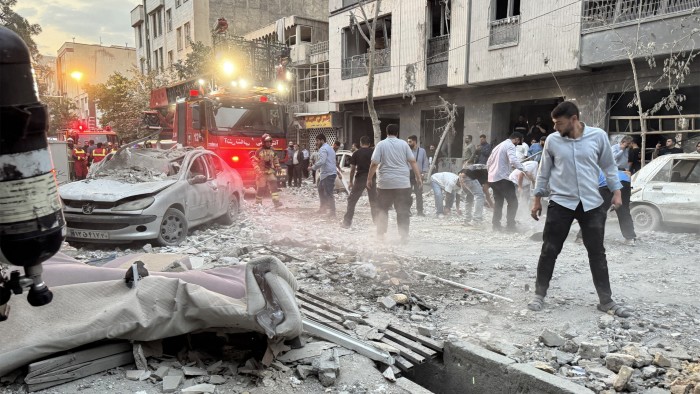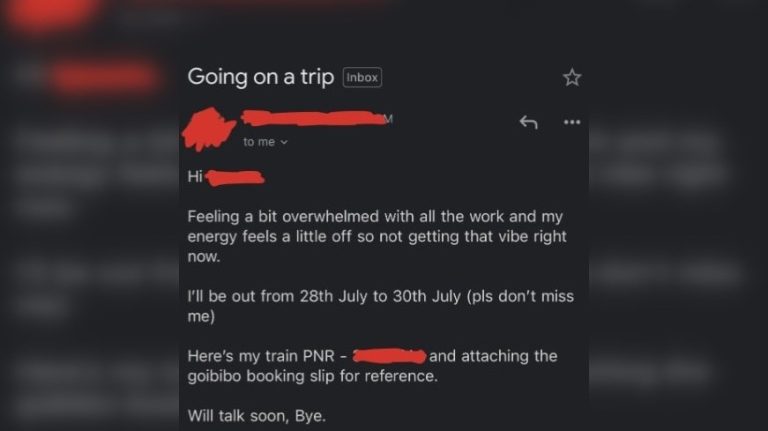Zahra, a 53-year-old Iranian woman, was jolted awake at around 3.30am on Friday by the deafening sound of explosions that shook her apartment in Tehran.
Initially disoriented, she wondered if it was just a thunderstorm. But as she stepped on to her balcony, a grim reality set in: neighbours in the western district of Chitgar were screaming and running out of their houses in panic.
“People rushed into the streets, men and women shouting, ‘Israel has attacked!’ They seemed to feel safer outside than inside their homes,” Zahra told the Financial Times, still in shock. “I couldn’t believe it. Are we really at war now?”
Friday night turned into a long, devastating ordeal — particularly for the Islamic republic’s leaders. The Israeli strikes, launched in the dead of night, killed several of Iran’s top commanders and nuclear scientists, and damaged one of the country’s prized nuclear sites.
In Tehran, a city of 10mn people, residents woke to casualties, smoke and confusion following explosions that reverberated through middle-class areas in the eastern and western neighbourhoods, as well as in the affluent northern districts where many regime elites reside.
The entire city found itself vulnerable — a stark sign of Israel’s intelligence network penetrating deep into the republic. The attack marks the first time that Israel has struck civilian areas in the Iranian capital.
At least six nuclear scientists and roughly the same number of senior military figures were killed either in their homes or at military headquarters in the Iranian capital.
Among the casualties was Major General Hossein Salami, commander of the Islamic Revolutionary Guards Corps (IRGC), hours after he warned the US and Israel that his forces were “ready for all scenarios”.
“We have experience in war, we are seasoned, we have built power, we have a strategy, we have identified the targets,” he had declared. He was killed while at the IRGC’s main headquarters in eastern Tehran.
Air force commander Amir Ali Hajizadeh and other officers were also killed in a strike on an IRGC centre, said the Revolutionary Guards.
In another huge blow, Major General Mohammad Bagheri, chief of the armed forces, was killed at his home, possibly while asleep.
This was a loss unlike anything seen even during the Iran-Iraq War of the 1980s, the most bloody, consequential and longest conflict the Islamic republic has ever faced.
It also marked the first time Israel had targeted residential buildings to eliminate key figures involved in Iran’s nuclear enrichment, ballistic missile development and regional policies.
The question Iranians confronted on Friday: is this the all-out war they had all feared?

Reports emerged of explosions across the country, from central Iran to the north-west, including the main uranium enrichment facility in Natanz. Israel said on Friday that it had “damaged” the underground area of the site.
State television showed damaged residential buildings, some still in flames, with firefighters, ambulances and ordinary people offering to help extract survivors. Local media and eyewitnesses confirmed that an unknown number of civilians, including women and children, had been killed in the attacks.
The Islamic republic’s leaders, including Supreme Leader Ayatollah Ali Khamenei, vowed swift retaliation. In a bid to project resolve, Khamenei also announced the immediate replacement of the two top commanders who had been killed.
But Israel’s decision to strike at this time reflected its assessment that the regime was vulnerable. Since the October 7 attacks by Hamas in 2023, Israel has dealt a severe blow to Iran’s decades of investment in its so-called Axis of Resistance — a network of alliances that includes Lebanon’s Hizbollah, Iraqi Shia militias, Hamas and Yemen’s Houthis.
These proxy forces, Hizbollah in particular, were intended to shield Iran from a direct confrontation with Israel or the US. But they have suffered devastating losses, leaving Tehran more exposed.
Iran’s retaliatory options are also limited. While Tehran has often threatened to hit back against US facilities in the region, that would risk direct conflict with the US. Since the strikes, Khamenei’s statement and those from other officials remained vague on the specifics of Iran’s strategy.

At the same time, it was unclear whether Iran would continue its indirect nuclear talks with the US. The discussions, facilitated by Oman, had seen both sides stubbornly cling to their red lines. Iran insists on continuing to enrich uranium domestically, even at the risk of Israeli or US military action, while the US demands that all nuclear facilities be dismantled.
US President Donald Trump on Friday warned Iran of “even more brutal” attacks to come, calling on Tehran to “make a deal” over its nuclear programme “before there is nothing left”.
Ali Larijani, a senior political adviser to Khamenei, sharply criticised what he called US duplicity, accusing Trump of backing the diplomatic path while allegedly coordinating the Israeli attack on the same day. “This shows the American nation has a clown as president . . . who cannot be trusted,” Larijani told state television.

As it weighs how to respond, Iran will also be taking into account the domestic front.
Iran has faced the assassination of several senior figures since the turbulent years following the 1979 Islamic Revolution, including the loss of both a president and prime minister in a single bombing. Yet over the decades, the regime managed to stabilise its internal affairs. It has long portrayed Iran as one of the safest countries in the region — a narrative built on a combination of domestic repression and a regional strategy of exporting conflict through proxy forces to keep war away from its borders.
But the regime now faces mounting economic pressures that could provoke public unrest. After the attacks, Iran’s police chief Ahmad Reza Radan urged calm, advising citizens to follow official news channels and warning that anyone who disrupted order would face prosecution.
“It is true that we lost commanders, which is bitter . . . but this is not going to shake the [political] system,” Alaeddin Boroujerdi, a senior member of parliament, told state television. He acknowledged the attack’s heavy toll but suggested it could lead to a shift in military posture.
“We cannot let them [Israeli citizens] be immune while our capital city is attacked and women and children are killed,” he added. “We need a new deterrence to punish this regime.”








